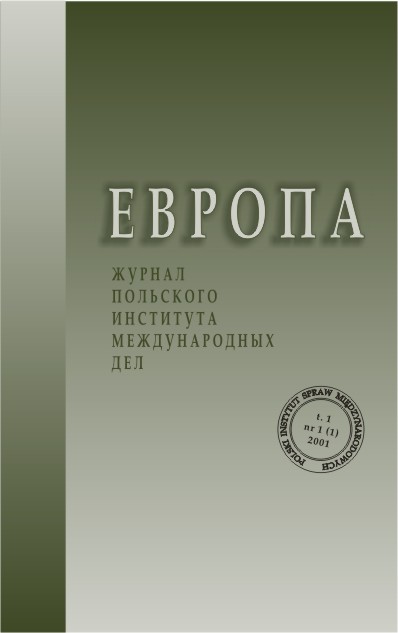


In 2006 the Polish Institute of International Affairs launched the Polish and English version of Materiały Studialne PISM Research Papers, an electronic publication on crucial international issues.
More...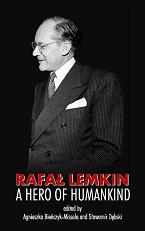
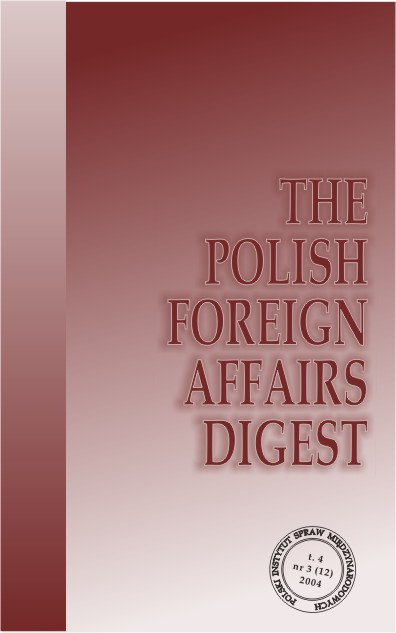
The Polish Foreign Affairs Digest. English Language Versions of Papers Published in the Polski Przegląd Dyplomatyczny and other Journals in Poland
More...
At the beginning of 2008 the Polish Institute of International Affairs launched PISM Strategic Files, an electronic publication from the analysts of the Institute that provides long-term strategic overview of crucial international issues. The aim of the editors is to give an interesting and valuable contribution to political analysis worldwide, as seen from the Polish perspective.
More...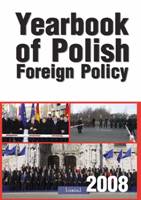
Yearbook of Polish Foreign Policy is devoted to the Polish foreign policy, international relations, Poland and the European Union, security policy. It looks at selected Polish foreign policy issues in given year (e.g. bilateral relations and activity in multilateral institutions) and also attempts to draw up a balance sheet for that policy. Yearbook of Polish Foreign Policy contains a chronicle of Poland's international relations and a review of Poland's treaty relations; it also profiles the leadership of the Polish foreign service.The articles are published in English.
More...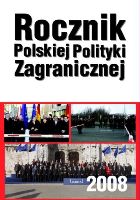
Yearbook of Polish Foreign Policy is devoted to the Polish foreign policy, international relations, Poland and the European Union, security policy. The articles are published in Polish.
More...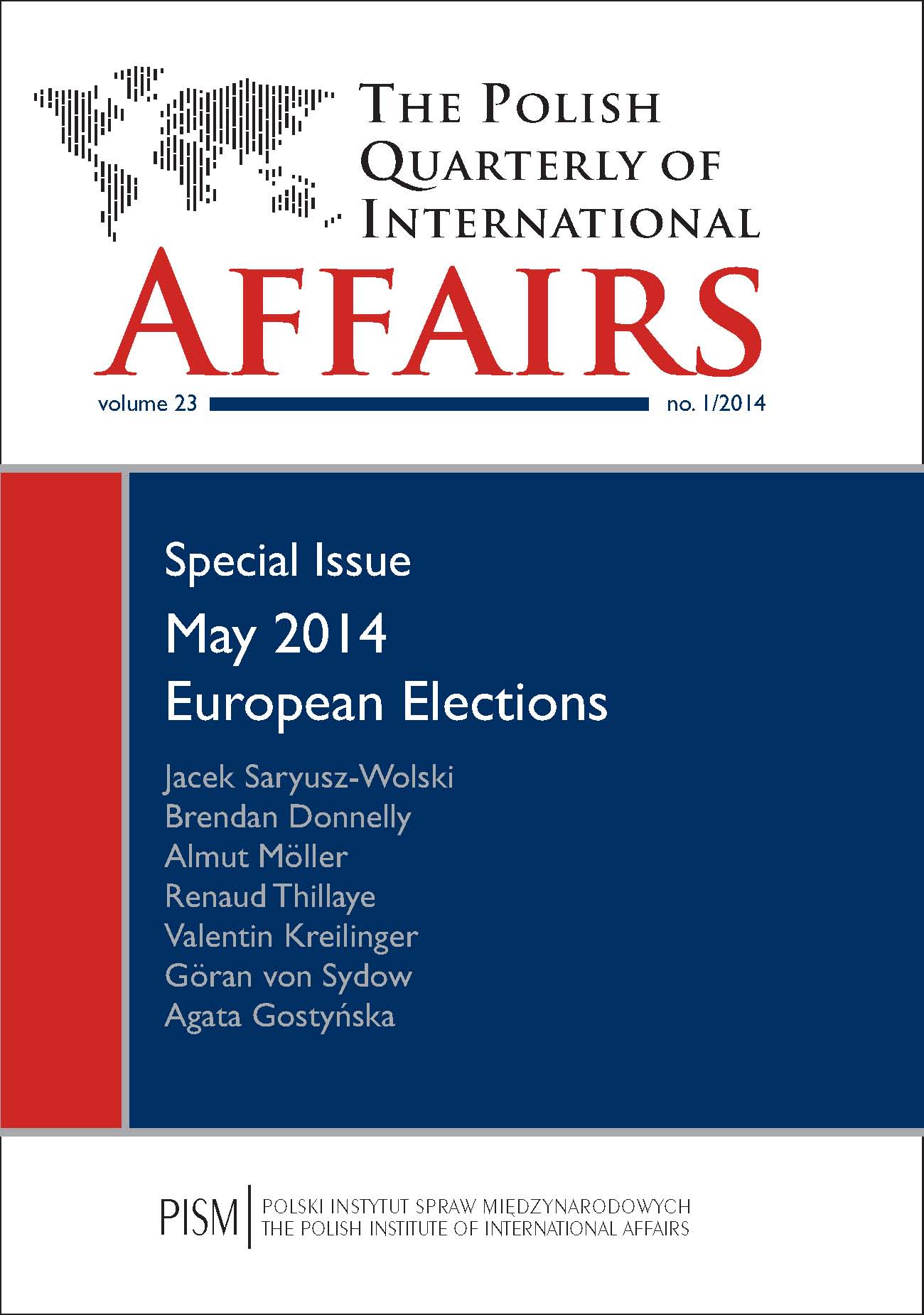
"The Polish Quarterly of International Affairs" publishes a selection of articles from "Sprawy Międzynarodowe" and "Polski Przegląd Dyplomatyczny". It is a scientific and political quarterly presenting opinion both on current international developments and theories of international relations. The quarterly has been focusing on: international security, European integration, foreign policies of different countries, regional development, international organisations and economic issues. The standard contents include articles, studies, reviews, notes and the chronology of international events.
More...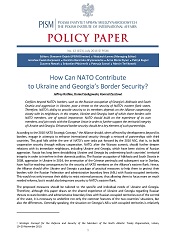
Keywords: Georgia; OTAN; NATO; Ukraine; Security; East Europe
Conflicts beyond NATO’s borders, such as the Russian occupation of Georgia’s Abkhazia and South Ossetia and aggression in Ukraine, pose a threat to the security of NATO’s eastern flank states. Therefore, NATO’s ability to provide security to its members depends on the Alliance cooperating closely with its neighbours. In this respect, Ukraine and Georgia, both of which share borders with NATO members, are of special importance. NATO should build on the experience of its own members, and join ranks with the European Union in order to further support the territorial integrity of Ukraine and Georgia. Enhanced border security should be a key element of such partnerships.
More...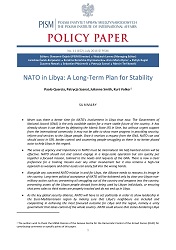
Keywords: Libia; NATO; OTAN; Bezpieczeństwo; Bliski Wschód i Afryka Północna; Security
Never was there a better time for NATO’s involvement in Libya than now. The Government of National Accord (GNA) is the only available option for a more stable future of the country. It has already shown it can deliver by defeating the Islamic State (IS) in Sirte, but without urgent support from the international community it may not be able to show more progress in providing security, reform and services to the Libyan people. Once it receives a request from the GNA, NATO can and should assist in SSR, border control and countering people-smuggling as there is no better placed actor to help Libya in this regard.
More...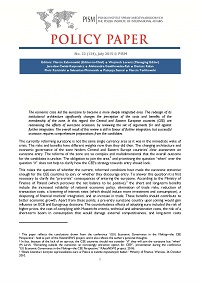
Keywords: USA; visa; Poland; European Union
In a communication of 12 April, the European Commission assessed the potential political and economic consequences of suspending visa exemption for U.S. citizens. Lacking pressure from individual EU Member States, the Commission discouraged such a move and gave the EU Council and European Parliament three months to take an official position. It seems almost certain that the measure of applying pressure on a non-EU country will not be used to help Poland and four other Member States obtain visa-free travel to the United States or other countries with a similar restriction. However, if current trends continue, Poland should join the U.S. Visa Waiver Programme in five years.
More...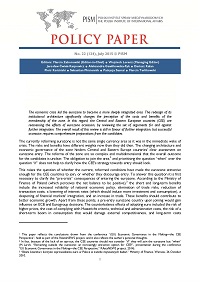
Keywords: Brazil; Visegrad Group; Poland; European Union; Hungary; Czechia; Slovakia; economy; V4
The Visegrad Group is still a new label among policy makers as well as public and private investors, scholars and media in Brazil. However, since their accession to the EU in 2004, and the financial crisis that started in 2008, the four Central European countries in this group have started to look beyond Europe in order to formulate their economic and political agenda, aiming to boost partnerships, for example among the biggest South American countries such as Brazil. V4 and Brazil should build momentum to deepen cooperation in the most promising prospective areas such as trade, military, tourism and education.
More...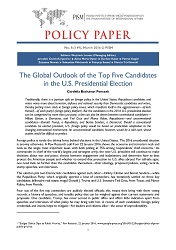
Keywords: USA; Bernie Sanders; Donald Trump; Hillary Clinton; Marco Rubio; Ted Cruz; elections
Traditionally, there is a partisan split on foreign policy in the United States: Republican candidates and voters worry more about terrorism, defence and national security than Democratic candidates and voters, thereby putting more stock in foreign policy issues, which manifests itself in the aggressiveness—of lack thereof—of each party’s foreign policy platform. But the candidates in the 2016 U.S. presidential election can be categorised by more than just party: a line can also be drawn between conventional candidates—Hillary Clinton, a Democrat, and Ted Cruz and Marco Rubio, Republicans—and unconventional candidates—Donald Trump, a Republican, and Bernie Sanders, a Democrat. Should a conventional candidate be elected president, U.S. foreign policy would be based on predictable adaptation to the changing international environment. An unconventional candidate, however, would be a wild card, whose actions would be difficult to predict.
More...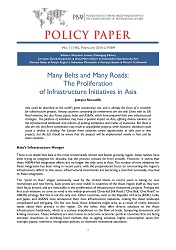
Keywords: China; India; Japan; South Korea; ASEAN, Asia; East Asia
Asia could be described as the world’s great construction site, and is already the focus of a scramble for infrastructure projects. Among countries competing for investments are not only China with its Silk Road initiative, but also Korea, Japan, India and ASEAN, which have prepared their own infrastructural strategies. The plethora of initiatives may have a positive impact on Asia, offering diverse solutions to the infrastructural bottleneck and reforms of existing institutions and modes of assistance. But there is also the risk that fierce competition may result in unprofitable projects, while economic slowdown could cause a decline in funding. For Europe these initiatives create opportunities to take part in new projects, but the EU should be aware that the projects will be implemented mainly in Asia and by Asian countries.
More...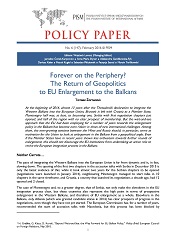
Keywords: Balcans; Bosnia and Hercegovina; Croatia; European integration; European Union
At the beginning of 2016, almost 13 years after the Thessaloniki declaration to integrate the Western Balkans into the European Union, Brussels is left with Croatia as a Member State, Montenegro half way, at best, to becoming one, Serbia with first negotiation chapters just opened, and half of the region with no clear prospect of membership. But the wait-and-see approach that the EU had been employing for a number of years towards the enlargement policy in the Balkans1has become even riskier in times of new international challenges. Among them, the ever-growing tensions between the West and Russia should, in particular, serve as motivation for the Union to look at enlargement in the Balkans from a geopolitical angle. Even if the Member States have in recent years shown less enthusiasm towards further rounds of enlargement, this should not discourage the EU institutions from undertaking an active role to revive the European integration process in the Balkans.
More...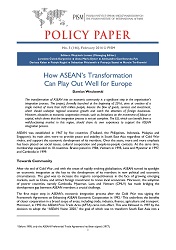
Keywords: ASEAN; Asia; South Asia; East Asia; Economy
The transformation of ASEAN into an economic community is a significant step in the organisation’s integration process. The project, formally launched at the beginning of 2016, aims at creation of a single market of more than 620 million people, loosens the flow of goods, services and investment, which should underpin regional economic growth and catch the attention of foreign businesses. However, obstacles to economic cooperation remain, such as limitations on the movement of labour or capital, which shows that the integration process is not yet complete. The EU, which can benefit from a well-functioning market in this region, should share its own experience to support the ASEAN integration process.
More...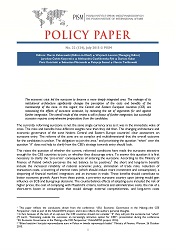
Keywords: ISIS; Turkey; security; Middle East
Recently, Turkey and the U.S. signed an agreement for Turkey to join the coalition’s fight against the Islamic State (IS, a.k.a. ISIS/ISIL). As part of this agreement an IS-free zone will be created in Syria, but it is not clear yet whether this will encroach on the territory of the People’s Protection Units (YPG), the main Kurdish armed group operating in Syria. The YPG has been one of the most successful forces on the ground in the fight against IS and despite the changing dynamics it still remains important. However, Turkey’s entry into the battle will lead to every aspect of the YPG being reassessed, as Turkey deems it to be a terrorist organisation. Nonetheless, the YPG still has a significant role to play and abandoning it now could lead to the situation in Syria becoming even more complex.
More...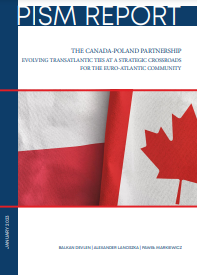
Keywords: Canada; Poland; Transatlantic Ties;
Eight decades of relations have led to Canada and Poland forging a unique partnership that strengthens the transatlantic alliance and Euro-Atlantic community they both share. Since Poland’s peaceful transition away from the Soviet sphere of influence, bilateral relations continue to tighten as Canada broadens its political, economic, and military ties in Central and Eastern Europe - one of the European Union’s most dynamic and developing regions. Canada and Poland further bolstered their strategic partnership following Russia’s unprovoked war of aggression in Ukraine in February 2022, which poses risks to European stability, transatlantic security, and the rules-based international order that the two allies commonly value. Poland is now Canada’s go-to partner in Central and Eastern Europe, providing conditions for deeper collaboration in such key areas as defence, energy, economic development, and regional security. Canada and Poland work together politically to address pressing global challenges and crises by promoting shared like-minded positions with respect to the rules-based international order, democratic values, and free trade. They regularly support each other in various multilateral platforms like the North Atlantic Treaty Organization (NATO), the United Nations (UN), the Arctic Council, and others. Polish-Canadian relations have the potential for even more growth in the medium to long term. To exploit that potential, Canada and Poland must diversify the partnership’s “toolbox” with instruments recommended in this report to push each other towards closer bilateral and transatlantic cooperation. These recommendations include: Launching and developing a Canada-Poland Strategic Partnership Framework; Poland ratifying the Canada-European Union Comprehensive Economic and Trade Agreement (CETA); Canada publicly supporting the Three Seas Initiative (3SI); actively cooperating with 3SI members, especially Poland, in the energy sector (including natural gas, nuclear, and hydrogen) and deepening pan-domain security and military cooperation.
More...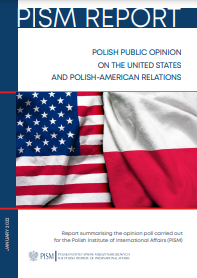
Keywords: USA; Poland; relations; foreign policy; public opinion;
This report summarises the key findings of two opinion polls commissioned by the Polish Institute of International Affairs (PISM) in August 2021. The subject of both polls was the attitude of Poles towards the United States and various aspects of Polish-American relations. The surveys were preceded by PISM analysts’ work on the development of a specific catalogue of interests and opportunities as well as problems and challenges in Polish-American relations. They were then grouped thematically into six categories and subjected to further sociological analysis and questions by public opinion researchers cooperating with PISM. The main issues examined by us included: − the general attitude of Poles towards the United States; − the perception of the principles and strategic objectives of U.S. foreign policy; − the approach of Poles to security in bilateral relations with the United States; − the perception of the style of American diplomacy in Poland; − Poles’ assessment of the bilateral economic and technological cooperation; − expectations of Poles towards the United States. − The issues analysed are likely to remain relevant in bilateral relations both in the short and long term. The question of Poles’ current attitude towards the United States has been repeatedly taken up in public opinion polls by domestic research centres, including the Public Opinion Research Centre’s (CBOS) survey on Poles’ sympathies and antipathies towards other nations, which has been conducted for more than two decades. The issue of perceptions of the current and previous U.S. presidential administrations have also been addressed within the broader and cyclical study “Transatlantic Trends” carried out by the German Marshall Fund of the United States (GMF). This PISM report, however, is the first such comprehensive and public analysis focused exclusively on Poles’ perception of the United States, Poland’s key ally. We see this report as a first step towards future systematic and comparative studies of the attitude of Poles towards U.S. policies. We will aim to repeat such surveys every 2 to 3 years, which would allow us to capture elements of change or continuity in Polish public opinion’s perception of the United States. It is important to emphasise that the survey revealed very good attitudes towards strengthening the relations in general, as well as in specific areas of Polish-American cooperation. Almost two-thirds of Poles have a positive attitude towards the United States, while more than half believe that since 1989 the two countries have been linked by “special ties”. Almost half of the respondents declare an interest in U.S. foreign policy. The level of responses indicating a generally positive assessment of the current state of bilateral relations, considered as based on partnership and serving common interests, was similar. Given the opportunity to indicate the most important ally, almost half of the surveyed Poles pointed to the United States (interestingly, one in five indicated “none”). The vast majority of Poles (62%) were convinced of the American will and readiness to react militarily in the event of a direct threat to Poland. There was also a strong preponderance (66%) of opinion among the respondents that the United States is right to demand that European NATO countries increase their national defence spending. Paradoxically, the coincidence of our polls and the fall of the U.S. and NATO-backed Afghan authorities in Kabul did not really influence the respondents’ answers. On the contrary, the events in Afghanistan even strengthened Poles’ affinity for America and confidence in its security guarantees for allies such as Poland (see also the “Introduction” and “Background of the Study”). The emotionality and tone of some of the comments on the end of the mission in Afghanistan may reflect a gap between the perception of these events by Polish opinion-makers or media and the opinion of the Poles randomly surveyed at the same time. Nearly half of Poles (44%) believe that the United States remains a country that sets standards for democracy in the world, while only 10% express the opposite opinion. An even higher percentage of positive responses (jointly 72%) was noted in assessments of the importance of American investments in the Polish economy and benefits for Poland relating to the supplies of American liquefied natural gas (60%). Exactly half of the Poles surveyed also stated that the overall image of the United States in Poland has steadily improved over the past 20 years, with slightly fewer respondents (41%) expecting bilateral relations to improve in the future. Such high expectations are expressed despite the simultaneous conviction of Poles about the limited influence of Polish-Americans on U.S. domestic and foreign policy (only every tenth respondent consider this group highly influential). The above opinions confirm the belief long expressed by experts and media that Poles have a positive attitude towards the United States. Some of the answers given, however, make it clear that this is by no means an uncritically pro-U.S. approach. For example, Poles express a negative assessment of the decision of the Biden administration to lift U.S. sanctions related to the construction of the Nord Stream 2 gas pipeline, with more than half considering it contrary to Polish interests. Most Poles (53%) are also against the possible deployment of U.S. nuclear weapons in Poland, regardless of the circumstances of this still very unlikely and hypothetical decision. Only 13% of Poles would accept the deployment of a nuclear arsenal in peacetime, while only one in four would allow it in times of a greater threat to Poland. This is one of the survey results that will require in-depth research as it opens up room for different interpretations (we assume that Poles’ attitude to nuclear weapons is similar to other European countries). Every second Pole (54%) expects that the acquisition of military equipment from the United States should always be linked to the creation of opportunities for the development of the Polish defence industry. It is also noteworthy that exactly three-fourths of the respondents expressed the belief that American troops deployed in Poland should be subject to Polish criminal law, while only 20% agreed that they should be subject to only American law (which is previously agreed and current). These responses, however, can be regarded as not particularly distinguishable from the views expressed by the populations of other U.S. allies where American troops are stationed. The results of the surveys on the perception of past deliveries of military equipment and the criminal immunity of U.S. forces in Poland require further attention from the authorities of both countries, ahead of action, especially given the potential for misunderstandings or ambiguities precisely against this background. Also noteworthy are those responses that may pose a challenge to the future bilateral relations between the United States and Poland. Above all, the survey revealed very serious generational differences. The youngest respondents (aged 18–24) show little interest in United States foreign policy and do not see the benefits of the Polish-American alliance. This generation also less frequently identifies the United States as Poland’s most important ally and thus sees no ‘special ties’ linking the two countries. The same group of respondents does not particularly care about the question of the country of origin of advanced technologies, and generally prefers Europe keeping distance from the multidimensional Sino-American rivalry. Interestingly, these opinions are expressed in tandem with the generally high support of the youngest Poles for Biden’s foreign policy. The issue of Europeans’ attitude to the growing Sino-American rivalry would undoubtedly also require further research in Poland and other European countries. At the same time, it would be accurate to claim the youngest Poles have little knowledge on the subject, stemming from their selection of “I don’t know” or neutral responses. This is the consequence of their low interest in international politics in general. However, the youngest respondents also seem quite susceptible to the current and future impact of China’s disinformation campaigns aimed at its American rival. This group, unlike previous generations of Poles, has no direct political experience shaping a positive image of the United States, for example, the direct memory of the U.S. support to the anti-communist opposition before 1989 or with Poland’s accession to NATO. Not all elements of U.S. security cooperation seem to be understood by Polish public opinion. Only 24% of respondents declared that they know the purpose of the U.S. antimissile base being built in Redzikowo. However, their answers to the subsequent question showed that they misperceived the purpose of this site, with only one in ten pointing to missile threats from Iran (correct answer), while the vast majority (64%) pointed to threats from Russia. More than a decade after this U.S.-NATO project began, these results demonstrate the low effectiveness of U.S. and allied public diplomacy communication. The results may also be linked to the relative effectiveness of Russian disinformation, which constantly presents the site in Redzikowo as being aimed precisely at Russia. The issue of clarifying the purpose of this component of the Atlantic Alliance missile defence system should be treated with more attention by decision-makers in Washington, Brussels, and Warsaw. Polish-American relations have a unique and very strong legitimacy among Poles. Taking into account the objective asymmetry of their potentials as well as the priorities and interests of both countries, it is clear that Poles appreciate the balance of the Polish-American cooperation to date, which also translates into cooperation in NATO, the UN, and other international bodies. However, the analysis of Poles’ responses to specific questions shows that this recognition is not due so much to sentiment or illusion about the nature of the “special ties” as it is to a common-sense understanding of the asymmetry and convergence/divergence of interests of the two countries, and even to the distance of Poles from certain decisions or priorities of a given administration in Washington. The already visible generational changes noted in the polls may in future bring an increase in the number of Poles critical of the United States, which currently are a small percentage of the respondents. This, in turn, would entail a parallel decline - although difficult to predict in terms of time and scale - in the level of Polish acceptance of American actions or the pursuit of specific interests in Poland and Central Europe. We encourage you to read this PISM report in its entirety, treating the results provided as a contribution to the discussion on various aspects of bilateral and transatlantic relations conducted both in Poland and in the U.S.
More...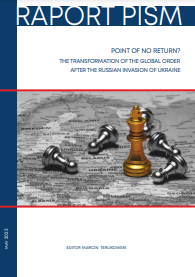
Keywords: Russia; Ukraine; Invasion; Global Order; Transformation; Changes;
The day everything changed, a critical moment, a turning point in history - this is how many commentators have described the 24th of February 2022. The day of the massive Russian invasion of Ukraine became not only the nominal date of the beginning of a full-scale war but also symbolic of a fundamental change in the international order comparable to 1 September 1939, 9 November 1989, or 11 September 2001. But is it really the case that nothing will be the same in international relations after 24 February 2022? For many non-Europeans, the Russian-Ukrainian war remains a regional one, with limited consequences for other parts of the world. Some may add that these regions have also suffered from equally disastrous, if not more deadly conflicts in recent years. The Russian diplomats often point out that Moscow’s relations with some countries have not deteriorated as compared to the pre-war period, and are actually deepening and intensifying. To further complicate matters, some experts view the events of 24 February 2022 not as a singular turning point in history, but rather as the next stage of a war waged by Russia against Ukraine, or against the West, that had begun much earlier. It may also be possible to see this particular day as merely an element of a global polycrisis, a series of political, economic, health, humanitarian, climate, and social crises that are overlapping and mutually amplifying their negative impacts. This collection of short analyses from experts with the Polish Institute of International Affairs attempts to answer questions about the scope, nature, and significance of the changes in the international system that were triggered or amplified by Russia’s February 2022 invasion of Ukraine. Central to this approach is the distinction between the reaction of states and international organisations to the war and a change, understood as a profound and difficultto-reverse transformation of the conceptual framework of conducting policy, resulting in a significant and implemented (as opposed to announced) modification of foreign, security, economic or domestic policy. Documenting this change is the focus of the authors of this report. In some cases, the change was radical and almost revolutionary. Examples include the upending of the pre-February 2022 model of the European Union’s relationship with Russia in the energy sphere, as well as the decision by Sweden and Finland to join NATO. In most situations, however, the response to the latest Russian aggression fell within previously observed policy trends or plans, but with a significant acceleration and deepening. The rise of the Global South’s self-identification, China’s international self-positioning in opposition to the “collective West”, or the evolution of the Atlantic Alliance towards a forward defence posture can be seen as falling into this category. Similarly, it was not altogether surprising that Russia’s aggression has brought Ukraine and its European partners closer together, following on Kyiv’s stated political goal. In this case, it is tragic that this change was accelerated by the brutal Russian aggression. The war has also fundamentally changed Russia and its place in the international system. The process is far from finished. So far, neither the predictions that full international isolation of Russia would be possible, nor Vladimir Putin’s hope that victory over Ukraine would place Russia among the great powers co-shaping the global order in the 21st century, have come true. The authors’ adoption of this approach to and definition of change in international relations explains the special place of the United States in this review. Although the U.S. plays a key role in supporting Ukraine and mobilising the West, its response represents a continuation of the foreign and security policy strategy adopted before 24 February 2022, rather than a reshaping of it. Another challenge was the question of the permanence or irreversibility of decisions and processes initiated after 24 February 2022. Given the possibility of domestic changes (e.g., following elections in democratic states, but also changes in the power elite in Russia) or another radical transformation in international relations (e.g., following the use of nuclear weapons by Russia or North Korea), it is difficult to consider any process as fully irreversible. However, the authors of the individual chapters present arguments that, in each case, a political or structural critical mass has been exceeded, making the identified changes difficult to reverse. It is precisely our doubts about the sustainability and irreversibility of the German Zeitenwende that justify omitting it from this review. In the sphere of declarations, this is certainly a revolutionary change in German politics, but one year since the announcement, it remains only partially implemented and still appears to be controversial for significant parts of German public opinion and the political class. We hope that the analyses and projections contained in this collection of essays will provide a starting point for discussion and polemics. The ongoing war is likely to cause further changes and transformations in the international system. The contours of the “new world” that is emerging from the darkness of war are not entirely new, or completely unfamiliar. The 24th of February 2022 became not only a tragic date in Ukrainian and world history but also the beginning of a significant change in international relations. A better understanding of its nature can help us shape optimal strategies for states and international organisations to operate in the new circumstances.
More...